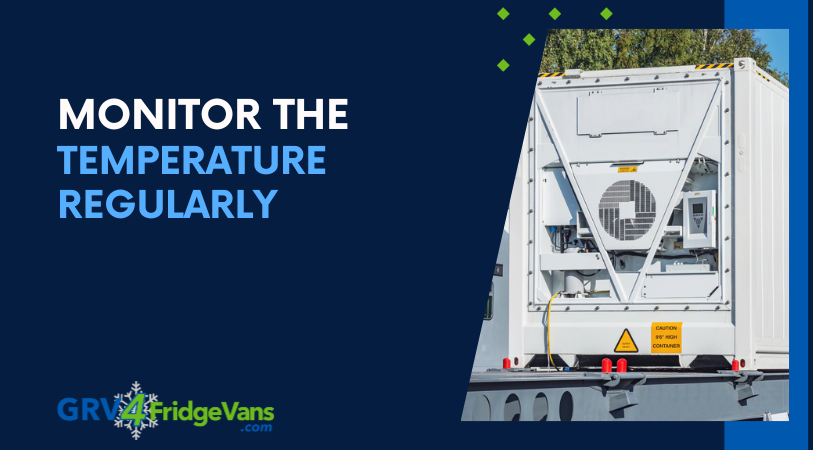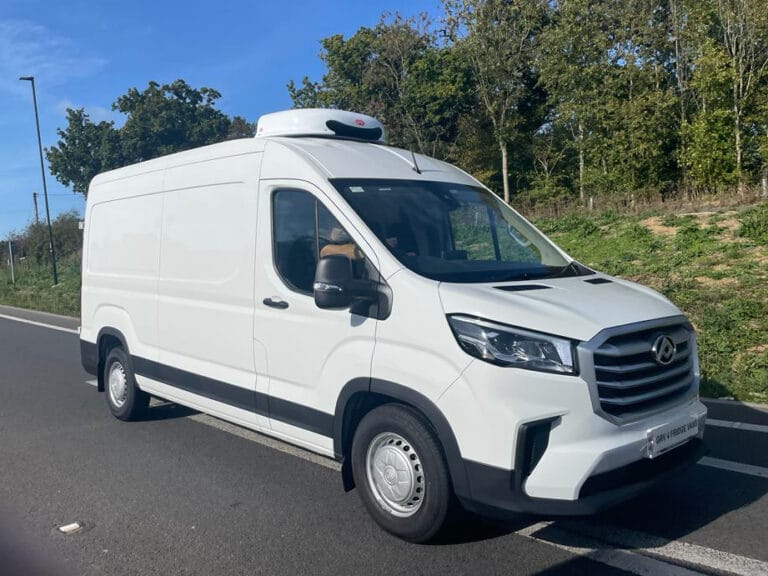As winter sets in, catering businesses and food transporters face unique challenges in maintaining the integrity of their products during transportation.
There’s a common assumption that colder conditions make it easier to transport food and catering products, but this isn’t really the case. The colder temperatures can impact the performance of refrigerated vans, potentially compromising the quality and safety of perishable goods.
In this guide, we will explore essential tips for maintaining your refrigerated van in winter, ensuring that your catering operations run smoothly even in the coldest months.

Monitor the temperature regularly
In winter, ambient temperatures are lower, affecting the internal temperature of your refrigerated van. Regularly monitor the temperature inside the van and make necessary adjustments to ensure that it stays within the required range.
Consider investing in vans with advanced temperature control systems that can adapt to external conditions automatically. The last thing you want is for your chiller section to work too effectively and freeze all of your fresh produce.
Prevent condensation
Cold weather often leads to condensation inside the refrigerated van, which can create a breeding ground for mould and bacteria. This is clearly a health risk and needs to be avoided at all costs.
Take steps to minimise condensation by using moisture-absorbing products and ensuring proper ventilation. Regularly inspect and clean the van’s insulation to prevent moisture buildup.

Monitor the battery health
Cold weather can be particularly harsh on batteries. Ensure that your van’s battery is in good condition, as it is crucial for powering the refrigeration system. Consider investing in a reliable auxiliary power unit (APU) to provide additional power for the refrigeration unit when the vehicle is stationary, reducing the strain on the main battery.
A battery failure could lead to a catastrophic loss of fresh stock and could also potentially damage your company reputation if you are forced to let down a client. This should be avoided at all costs.
Inspect and repair seals
Cold temperatures can cause rubber seals and gaskets on doors to become stiff and brittle, leading to potential air leaks. Regularly inspect and maintain these seals to ensure they remain flexible and provide an airtight seal.
Replace any damaged or worn-out seals promptly to prevent warm air from entering the refrigerated compartment. Broken and worn out seals will also put pressure on the refrigeration unit to work harder to maintain a steady temperature.

Get the van to the correct temperature before loading
Before loading perishable goods into the refrigerated van, allow it to warm up for a sufficient amount of time. This helps ensure that the internal temperature is stabilised, reducing the risk of temperature fluctuations during transit. Avoid loading the van when it is extremely cold, as this can make it challenging to reach and maintain the desired temperature.
Try investing in insulation blankets
Consider using insulation blankets for the refrigerated compartment during periods of extended inactivity or when the van is parked. These blankets help retain the cold air inside, preventing unnecessary energy consumption and ensuring that the contents remain at the desired temperature.
If you use your van for overflow storage and it is left overnight, then insulation blankets will help to reduce the cost of maintaining a steady temperature inside the van.

Check things over before winter
Winter conditions can be harsh on vehicles, so it’s crucial to conduct regular maintenance checks on your refrigerated van. Pay attention to the engine, tires, brakes, and all other critical components.
Keeping the vehicle in top condition contributes to the overall reliability and efficiency of your cold transport operations. Remember that mechanics might be busier in the winter months, so rather than waiting for the van to break down before you get it checked, try to be proactive and have it checked over in Autumn.
Closing thoughts
Maintaining a refrigerated van during winter requires careful attention to detail and proactive measures to safeguard the quality of your transported goods.
By monitoring temperature settings, preventing condensation, inspecting seals, ensuring a healthy battery, warming up the van before loading, using insulation blankets, and conducting regular maintenance checks, you can navigate the challenges of winter and keep your catering operations running smoothly.
A well-maintained refrigerated van not only preserves the freshness of your products but also contributes to the success and reputation of your catering business, even in the coldest months of the year. A well-maintained van will also cost less to run in the long-term. With the cost of running a business rising all the time, this will be music to the ears of cost-conscious business owners.




